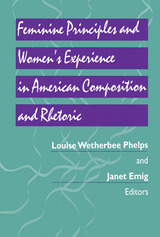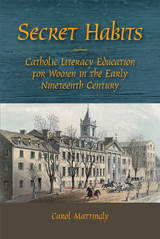3 books about Women in education

Feminine Principles & Women's Experience in American Composition & Rhetoric
Louise Phelps
University of Pittsburgh Press, 1995
In this unique collection, the editors and authors examine, against a rich historical background, the complex contributions that women have made to composition and rhetoric in American education. Using varied and at times experimental modes of presentation to portray teachers and learners at work, including the very young and the elderly, the text provides a generous and fresh feminine perspective on the field.
[more]

The Rise of Women
The Growing Gender Gap in Education and What it Means for American Schools
Thomas A. DiPrete
Russell Sage Foundation, 2013
While powerful gender inequalities remain in American society, women have made substantial gains and now largely surpass men in one crucial arena: education. Women now outperform men academically at all levels of school, and are more likely to obtain college degrees and enroll in graduate school. What accounts for this enormous reversal in the gender education gap? In The Rise of Women: The Growing Gender Gap in Education and What It Means for American Schools, Thomas DiPrete and Claudia Buchmann provide a detailed and accessible account of women’s educational advantage and suggest new strategies to improve schooling outcomes for both boys and girls. The Rise of Women opens with a masterful overview of the broader societal changes that accompanied the change in gender trends in higher education. The rise of egalitarian gender norms and a growing demand for college-educated workers allowed more women to enroll in colleges and universities nationwide. As this shift occurred, women quickly reversed the historical male advantage in education. By 2010, young women in their mid-twenties surpassed their male counterparts in earning college degrees by more than eight percentage points. The authors, however, reveal an important exception: While women have achieved parity in fields such as medicine and the law, they lag far behind men in engineering and physical science degrees. To explain these trends, The Rise of Women charts the performance of boys and girls over the course of their schooling. At each stage in the education process, they consider the gender-specific impact of factors such as families, schools, peers, race and class. Important differences emerge as early as kindergarten, where girls show higher levels of essential learning skills such as persistence and self-control. Girls also derive more intrinsic gratification from performing well on a day-to-day basis, a crucial advantage in the learning process. By contrast, boys must often navigate a conflict between their emerging masculine identity and a strong attachment to school. Families and peers play a crucial role at this juncture. The authors show the gender gap in educational attainment between children in the same families tends to be lower when the father is present and more highly educated. A strong academic climate, both among friends and at home, also tends to erode stereotypes that disconnect academic prowess and a healthy, masculine identity. Similarly, high schools with strong science curricula reduce the power of gender stereotypes concerning science and technology and encourage girls to major in scientific fields. As the value of a highly skilled workforce continues to grow, The Rise of Women argues that understanding the source and extent of the gender gap in higher education is essential to improving our schools and the economy. With its rigorous data and clear recommendations, this volume illuminates new ground for future education policies and research.
[more]

Secret Habits
Catholic Literacy Education for Women in the Early Nineteenth Century
Carol Mattingly
Southern Illinois University Press, 2016
Literacy historians have credited the Protestant mandate to read scripture, as well as Protestant schools, for advances in American literacy. This belief, however, has overshadowed other important efforts and led to an incomplete understanding of our literacy history. In Secret Habits: Catholic Literacy Education for Women in the Early Nineteenth Century, Carol Mattingly restores the work of Catholic nuns and sisters to its rightful place in literacy studies.
Mattingly shows that despite widespread fears and opposition, including attacks by vaunted northeastern Protestant pioneers of literacy, Catholic women nonetheless became important educators of women in many areas of America. They founded convents, convent academies, and schools; developed their own curricula and pedagogies; and persisted in their efforts in the face of significant prejudices. The convents faced sharp opposition from Protestant educators, who often played on anti-Catholic fears to gain support for their own schools. Using a performative rhetoric of good works that emphasized civic involvement, Catholic women were able to educate large numbers of women and expand opportunities for literacy instruction.
A needed corrective to studies that have focused solely on efforts by Protestant educators, Mattingly’s work offers new insights into early nineteenth-century women’s literacy, demonstrating that literacy education was more religiously and geographically diverse than previously recognized.
Mattingly shows that despite widespread fears and opposition, including attacks by vaunted northeastern Protestant pioneers of literacy, Catholic women nonetheless became important educators of women in many areas of America. They founded convents, convent academies, and schools; developed their own curricula and pedagogies; and persisted in their efforts in the face of significant prejudices. The convents faced sharp opposition from Protestant educators, who often played on anti-Catholic fears to gain support for their own schools. Using a performative rhetoric of good works that emphasized civic involvement, Catholic women were able to educate large numbers of women and expand opportunities for literacy instruction.
A needed corrective to studies that have focused solely on efforts by Protestant educators, Mattingly’s work offers new insights into early nineteenth-century women’s literacy, demonstrating that literacy education was more religiously and geographically diverse than previously recognized.
[more]
READERS
Browse our collection.
PUBLISHERS
See BiblioVault's publisher services.
STUDENT SERVICES
Files for college accessibility offices.
UChicago Accessibility Resources
home | accessibility | search | about | contact us
BiblioVault ® 2001 - 2024
The University of Chicago Press









